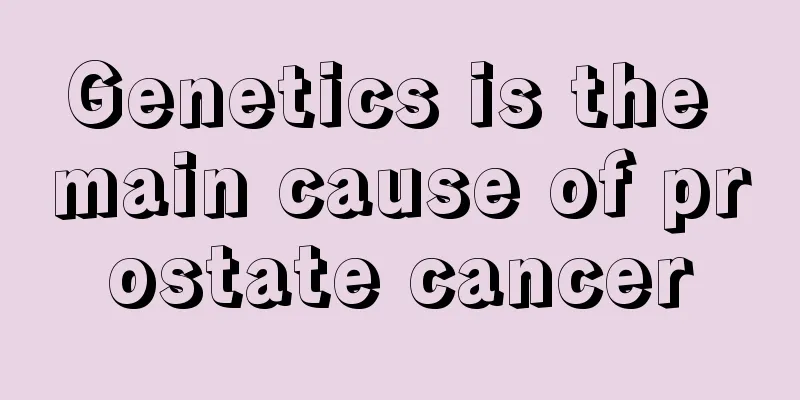Genetics is the main cause of prostate cancer

|
Men are all afraid of prostate diseases, and prostate cancer is a nightmare among nightmares. What causes prostate cancer? In recent years, experts have pointed out that heredity is the main cause of prostate cancer. The following will explain in detail what causes prostate cancer. In recent years, experts from various countries have been committed to the study of the causes of prostate cancer. They found that if a direct relative (brother or father) has prostate cancer, the risk of developing prostate cancer will increase by 1 times. If 2 or more direct relatives have prostate cancer, the relative risk will increase by 5 to 11 times. A subpopulation (about 9%) of the prostate cancer population is "true hereditary prostate cancer", which means that 3 or more relatives have the disease or at least 2 of them have early onset (before the age of 55). By collecting cases and family histories from multiple regions, experts have discovered what causes prostate cancer. Epidemiological studies have found that patients with a positive family history of prostate cancer are diagnosed about 6 to 7 years earlier than those without a family history, but there are no other differences. The probability of prostate cancer being found by biopsy is roughly similar in different parts of the world. This is in stark contrast to the significant differences in the incidence of prostate cancer in different regions, which is highest in the United States and Northern Europe and lowest in Southeast Asia. However, epidemiological studies have found that the incidence rate increases after Japanese immigrants move to Hawaii, and if they immigrate to California, the incidence rate increases significantly and approaches the incidence rate in the mainland United States. In addition, they also conducted another study to investigate the causes of prostate cancer. A meta-analysis included 11 case-control and 10 cohort studies to identify the correlation between tomato intake and the risk of prostate cancer. The results showed that a large amount of tomato consumption reduced the relative risk of prostate cancer to 0.81 (CI0.71-0.92). Other risk factors include low intake of vitamin E, selenium, lignans, and isoflavones. The above studies show that in addition to the endogenous factor of genetics, other exogenous factors can affect the progression from so-called latent prostate cancer to clinical prostate cancer. These factors such as food intake, sexual behavior, alcohol consumption, ultraviolet radiation exposure and occupational exposure are still under discussion as possible causes, but a diet high in animal fat is an important risk factor. Tomatoes contain lycopene, a strong antioxidant, which is currently being widely studied as a possible protective agent against the progression of prostate cancer. In summary, heredity is an important risk factor for prostate cancer, and exogenous factors should not be ignored. The key issue now is that there is not enough evidence to suggest that lifestyle changes (reducing animal fat intake and increasing the intake of fruits, grains, vegetables, and red wine) will reduce the risk of disease. There are some studies to support these claims, and this information can be provided to the families of male prostate cancer patients who come to ask about the impact of diet. |
<<: Is prostate cancer inherited from generation to generation?
>>: Is prostate cancer hereditary?
Recommend
How to treat ureteral stones with hydronephrosis
If ureteral stones are accompanied by hydronephro...
Why is the hair so long?
In life, for people who love beauty, if the body ...
Can constipation caused by hemorrhoids lead to colon cancer?
Will constipation caused by hemorrhoids lead to c...
Introduction to intestinal cleansing methods
There are already many methods for cleaning the i...
Does drinking tangerine peel and ginger soaked in water have these benefits?
The raw material of dried tangerine peel is orang...
The harm of eating too much mint candy
Candy is a favorite of children. Of course, that ...
Treatment for wrist pain when waking up from sleep
Many people have wrist pain after waking up, whic...
Can toothpaste remove nail polish?
For female friends, the purpose of growing long n...
What are the hazards and sequelae of skin soft fibroma
Skin soft fibroma is usually a benign tumor that ...
At what age does skin cancer first occur
What should I do if my face is ulcerated by skin ...
What are the common symptoms of liver cancer? 10 dietary health treatments for liver cancer
As the number of patients with liver disease incr...
How to treat skin dampness and toxins, six points to tell you
You can take capsules to treat dampness and toxin...
What is the reason for numbness in hands and feet? Be alert to physical diseases
If you often experience numbness in your hands an...
Why do I feel dizzy when I stand up from sitting?
Many people have experienced dizziness when stand...
What are the key points of postoperative care for colorectal cancer? Experts will introduce
Colon cancer is a disease that many people are af...









